Related Research Articles
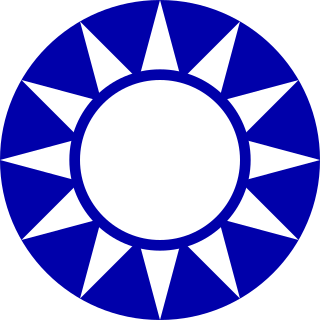
The Kuomintang (KMT), also referred to as the Guomindang (GMD), the Nationalist Party of China (NPC) the Chinese Nationalist Party (CNP), or the National People's Party of China, is a major political party in the Republic of China, initially based on the Chinese mainland and then in Taiwan since 1949. The KMT is a centre-right to right-wing party and the largest in the Pan-Blue Coalition, one of the two main political groups in Taiwan. Its primary rival is the Democratic Progressive Party (DPP), the largest party in the Pan-Green Coalition. As of 2024, the KMT is the largest single party in the Legislative Yuan. The current chairman is Eric Chu.

New Youth or La Jeunesse was a Chinese literary magazine founded by Chen Duxiu and published between 1915 and 1926. It strongly influenced both the New Culture Movement and the later May Fourth Movement.

Hua Guofeng was a Chinese politician who served as chairman of the Chinese Communist Party and the 2nd premier of China. The designated successor of Mao Zedong, Hua held the top offices of the government, party, and the military after the deaths of Mao and Premier Zhou Enlai, but was gradually forced out of supreme power by a coalition of party leaders between December 1978 and June 1981, and subsequently retreated from the political limelight, though still remaining a member of the Central Committee until 2002.

The Central Military Commission (CMC) is the highest military leadership body of the Chinese Communist Party (CCP) and the People's Republic of China (PRC), which heads the People's Liberation Army (PLA), the People's Armed Police (PAP), and the Militia of China.
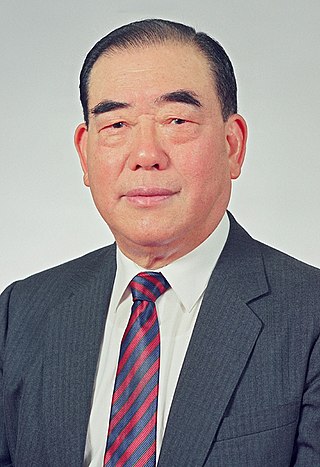
Hau Pei-tsun was a Chinese politician and military officer who was the Premier of the Republic of China (ROC) from 1 June 1990 to 27 February 1993, and the longest-serving Chief of the General Staff of the Republic of China Armed Forces from 1 December 1981 to 4 December 1989. On 6 July 2017, Hau attended an academic meeting in Nanjing about the history of the Second Sino-Japanese War, making him the first former ROC premier to visit Mainland China since the end of the Chinese Civil War in 1949. He died in March 2020 at age 100.

The Revolutionary Committee of the Chinese Kuomintang, commonly abbreviated in Chinese as Minge (民革), is one of the eight minor political parties in the People's Republic of China under the direction of the Chinese Communist Party.

Ye Jianying was a Chinese Communist revolutionary leader and politician, one of the Ten Marshals of the People's Republic of China. He was the top military leader in the 1976 coup that overthrew the Gang of Four and ended the Cultural Revolution, and was the key supporter of Deng Xiaoping in his power struggle with Hua Guofeng between 1978 and 1981, which ended in Hua fading into political obscurity. In his capacity as Chairman of the Standing Committee of the National People's Congress, Ye served as China's head of state from 1978 until 1983.
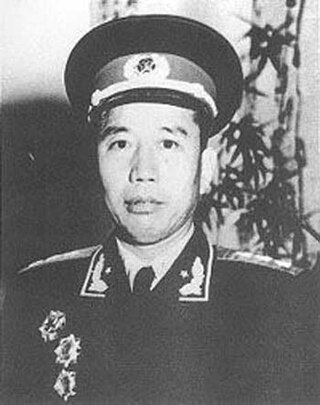
Wang Zhen, also named Yu Kai, once known as Zhenglin and Jiancheng, nicknamed Wang Huzi, a native of Liuyang, Hunan, was a former main leaders of the People's Republic of China and the Chinese Communist Party, Founding General of the People's Liberation Army.
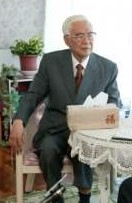
Bo Yang, sometimes also erroneously called Bai Yang, was a Chinese historian, novelist, philosopher, poet based in Taiwan. He is also regarded as a social critic. His best-known work is The Ugly Chinaman, a controversial book that was banned in mainland China; in it he harshly criticized Chinese culture and the national character of Chinese people. According to his own memoir, the exact date of his birthday was unknown even to himself. He later adopted 7 March, the date of his 1968 imprisonment, as his birthday.

The Chinese Peasants' and Workers' Democratic Party (CPWDP) is one of the eight minor political parties in the People's Republic of China under the direction of the Chinese Communist Party.
CTi News was a Taiwanese 24-hour online news outlet and, until December 2020, cable television channel, operated by Chung T'ien Television.
The history of the Chinese Communist Party began with its establishment in July 1921. A study group led by Peking University professors Chen Duxiu and Li Dazhao to discuss Marxism, led to intellectuals officially founding the Chinese Communist Party (CCP) in July 1921. In 1923, Sun Yat-sen invited the CCP to form a United Front, and to join his nationalist party, the Kuomintang (KMT), in Canton for training under representatives of the Communist International, the Soviet Union's international organization. The Soviet representatives reorganized both parties into Leninist parties. Rather than the loose organization that characterized the two parties until then, the Leninist party operated on the principle of democratic centralism, in which the collective leadership set standards for membership and an all-powerful Central Committee determined the party line, which all members must follow.

Cheng Tien-fong, was a Chinese educator, politician and diplomat. Cheng was a former President of Zhejiang University, and former Minister of Education of the ROC.
Phillip Ko-fei was a Hong Kong–based actor, screenwriter and film director.

Yang Lien-sheng who often wrote under the name L.S. Yang, was a Chinese-American sinologist and professor at Harvard University. He was the first full-time historian of China at Harvard and a prolific scholar specializing in China's economic history.
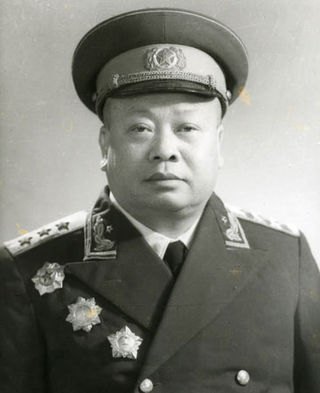
Lai Chuanzhu (simplified Chinese: 赖传珠; traditional Chinese: 賴傳珠; pinyin: Lài Chuánzhū; 3 April 1910 – 24 December 1965) or Peng Ying (鹏英) was a general of the People's Liberation Army from Gan County, Jiangxi.
Events from the year 1983 in China.

Sun Yueh was a Taiwanese actor.

Ma Hsin-yeh (Chinese: 馬星野; pinyin: Mǎ Xīngyě; Wade–Giles: Ma3 Hsing1-yeh3; September 13, 1909 – March 11, 1991) was born in Pingyang County, Zhejiang Province, and enjoyed a notable career as a pioneering Chinese journalist, educator, publisher, government executive and diplomat. Ma was known as the "King of Journalism" (新聞王), and collectively with his native place compatriots Xie Xia-xun the "Chess King" (謝俠遜; “棋王”) and Su Bu-qing the "Math King" (蘇步青; "數學王"), were known as the "Three Kings of Pingyang" (平陽三王). The Pingyang County Government has also officially named Ma as one of the top-ten most significant cultural-historical figures of the county. Ma adopted his penname Hsin-yeh (星 xīng 野 yě) as his personal name some time following his study abroad at the University of Missouri School of Journalism. The name incorporates the two characters for "stars" and "plain" from a line in the Tang dynasty poet Du Fu's poem Thoughts When Traveling at Night: "Stars hang low above the wide, flat plain, And up rides the moon as the mighty river flows on" (星垂平野闊, 月涌大江流). Years later in 1984 when Ma was head of the Central News Agency, the School awarded him its highest honor, the Missouri Honor Medal for Distinguished Service in Journalism.
References
- ↑ Li, Kuo-chi (1977). "The 1938 Extraordinary National Congress of the Kuomintang of China". Zhong Hua Xue Bao. Zhong hua xue bao. - Tai bei : Zhong hua xue bao she, ZDB-ID 192946-X. - Vol. 4.1977, 1, p. 127-146. 4 (1).
- 1 2 "Party's History". Kuomintang. Retrieved 2023-01-26.
- ↑ "歷屆全代會". Kuomintang. Retrieved 2023-01-26.
- ↑ 王桧林 (2016). 中国现代史. 北京师范大学出版社. p. 246-247.
